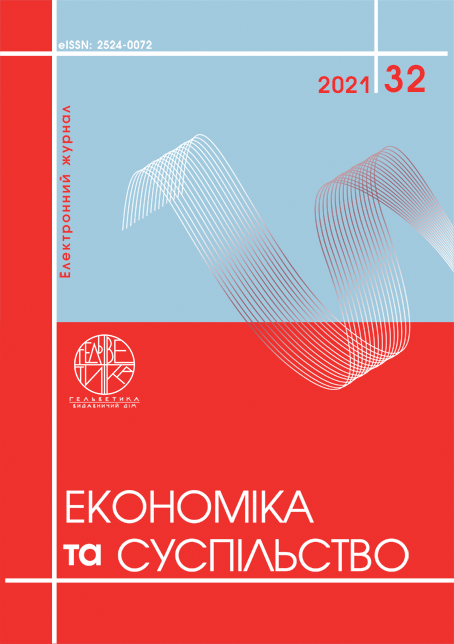ACCOUNTING IN NON-BUDGETARY NON-PROFIT ORGANIZATIONS OF UKRAINE: ACCOUNTING FOR RECEIVABLES
Abstract
In Ukraine, there is a significant lag in the current accounting system of non-budgetary non-profit organizations from the requirements of the time, despite significant progress in solving problems related to the processing of accounting information that have occurred in recent years. The method of double entry is used as the main technique of formation and generalization of information in accounting. The aim of the study is to develop modern scientifically sound measures to improve the current methodology of accounting for accounts payable for further development of the latest concept of accounting in the non-profit sector of the economy of Ukraine. The article takes into account the main features of non-budgetary non-profit organizations in Ukraine: the goals of financial and economic activities are different from making a profit; retained earnings that can be generated are used to support the main activity; the main purpose of activity – achievement of public goods; the main source of funds – targeted funding; lack of classical economic categories “capital”, “price” and “cost”; service-oriented organizations, respectively, production – no; lack of financial and speculative activities – transactions with shares, bonds, bills, etc.; performance can not be measured by standard indicators, such as profit. The article identifies and analyzes the procedure for accounting for receivables of non-budgetary non-profit organizations, taking into account the requirements of domestic law. Accounting for receivables in non-budgetary non-profit organizations is limited mainly by such operations as: accrual of membership fees, advance payments, calculations of temporary incapacity for work at the expense of the Social Insurance Fund of Ukraine and a number of others. The article also improves the method of accounting for receivables that arise in the course of financial and economic activities of non-budgetary non-profit organizations in Ukraine. The results obtained in the study can be useful for accountants of non-budgetary non-profit organizations to streamline the accounting of cash and receivables.
References
Ананич С.М. О делении юридических лиц на коммерческие и некоммерческие. Право в современном белорусском обществе. 2011. Вып. 6. С. 234–241.
Крамаренко Е.Н. Правовой статус некоммерческих организаций. Вектор науки ТГУ. Серия: Юридические науки. 2016. № 4 (27). С. 54–58.
Ягудина Г.Г. Проблемы унификации организационно-правовых форм некоммерческих организаций. Бухгалтерский учет в бюджетных и некоммерческих организациях. 2012. № 6 (294). С. 35–42.
Маньковский С.Л. Некоммерческие организации как важные экономические и общественные институты. Аудит и финансовый анализ. 2012. № 6. С. 419–420.
Дементьева Н.М. Необходимость и роль классификации некоммерческих организаций. Бухгалтерский учет в бюджетных и некоммерческих организациях. 2014. № 5 (341). С. 14–20.
Гусарова Л.В. Концепция бухгалтерского учета, аудита и анализа в некоммерческих организациях: автореф. дис. … докт. экон. наук: 08.00.12. Йошкар-Ола, 2010. 36 с.
Слободяник Ю.Б. Некоммерческие организации в Украине: Бухгалтерский учет, налогообложение и аудит. Бухгалтерский учет в бюджетных и некоммерческих организациях. 2013. № 6 (318). С. 29–36.
Кутьева Д.А., Макарова В.А. Особенности управления финансовыми ресурсами в некоммерческой организации: научная монография. Санкт-Петербург : Изд-во Политехн. ун-та, 2014. 185 с.
Височан О.О. Особливості організації і методології індикативного контролю у небюджетних неприбуткових організаціях. Проблеми теорії та методології бухгалтерського обліку, контролю і аналізу. 2017. № 3 (38). С. 8–14.
Котлова Ю.А. К вопросу о системе внутреннего контроля в некоммерческих организациях общественного сектора. Новое слово в науке: перспективы развития. 2014. № 2 (2). С. 257–259.
Гура Н. Методологічні засади бухгалтерського обліку в неприбуткових небюджетних організаціях. Бухгалтерський облік і аудит. 2012. № 9. С. 3–9.
Ananich, S.M. (2011). O delenii juridicheskih lic na kommercheskie i nekommercheskie [On the Division of Legal Entities into Commercial and Non-commercial]. Pravo v sovremennom belorusskom obshhestve – Law in Modern Belarusian Society, 6, 234–241. (in Russian)
Kramarenko, E.N. (2016). Pravovoj status nekommercheskih organizacij [Legal Status of Non-profit Organizations]. Vektor nauki TGU. Serija: Juridicheskie nauki – Science Vector of TSU. Series: Legal Sciences, 4 (27), 54–58. (in Russian)
Jagudina, G.G. (2012). Problemy unifikacii organizacionno-pravovyh form nekommercheskih organizacij [Problems of Unification of Organizational and Legal Forms of Non-profit Organizations]. Buhgalterskij uchet v bjudzhetnyh i nekommercheskih organizacijah – Accounting in Budgetary and Non-profit Organizations, 6 (294), 35–42. (in Russian)
Mankovskij, S.L. (2012). Nekommercheskie organizacii kak vazhnye jekonomicheskie i obshhestvennye instituty [Non-profit Organizations as Important Economic and Social Institutions]. Audit i finansovyj analiz – Audit and financial analysis, 6, 419–420. (in Russian)
Dementyeva, N.M. (2014). Neobhodimost' i rol klassifikacii nekommercheskih organizacij [Necessity and Role of Classification of Non-profit Organizations]. Buhgalterskij uchet v bjudzhetnyh i nekommercheskih organizacijah – Accounting in Budgetary and Non-profit Organizations, 5 (341), 14–20. (in Russian)
Gusarova, L.V. (2010). Koncepcija buhgalterskogo ucheta, audita i analiza v nekommercheskih organizacijah [The Concept of Accounting, Auditing and Analysis in Non-profit Organizations]. Extended abstract of Doctor’s thesis. Joshkar-Ola. (in Russian)
Slobodjanik, Ju.B. (2013). Nekommercheskie organizacii v Ukraine: Buhgalterskij uchet, nalogooblozhenie i audit [Non-profit Organizations in Ukraine: Accounting, Taxation and Audit]. Buhgalterskij uchet v bjudzhetnyh i nekommercheskih organizacijah – Accounting in Budgetary and Non-profit Organizations, 6 (318), 29–36. (in Russian)
Kutyeva, D.A., & Makarova, V.A. (2014). Osobennosti upravlenija finansovymi resursami v nekommercheskoj organizacii [Features of Financial Resources Management in a Non-profit Organization]. St. Petersburg : Izd-vo Politehn. un-ta. (in Russian)
Vysochan, O.O. (2017). Osoblyvosti orhanizatsii i metodolohii indykatyvnoho kontroliu u nebiudzhetnykh neprybutkovykh orhanizatsiiakh [Perculiaritiesof Organization and Methodology of Indicative Control in Nonbudget Unprofitable Organizations]. Problemy teorii ta metodolohii bukhhalterskoho obliku, kontroliu i analizu – Problems of Theory and Methodology of Accounting, Control and Analysis, 3 (38), 8–14. (in Ukrainian)
Kotlova, Ju.A. (2014). K voprosu o sisteme vnutrennego kontrolja v nekommercheskih organizacijah obshhestvennogo sektora [On the Issue of the Internal Control System in Non-profit Organizations in the Public Sector]. Novoe slovo v nauke: perspektivy razvitija – A New Word in Science: Development Prospects, 2 (2), 257–259. (in Russian)
Hura, N. (2012). Metodolohichni zasady bukhhalterskoho obliku v neprybutkovykh nebiudzhetnykh orhanizatsiiakh [Methodological Principles of Accounting in Non-profit Non-budget Organizations]. Bukhhalterskyi oblik i audyt – Accounting and Auditing, 9, 3–9. (in Ukrainian)


